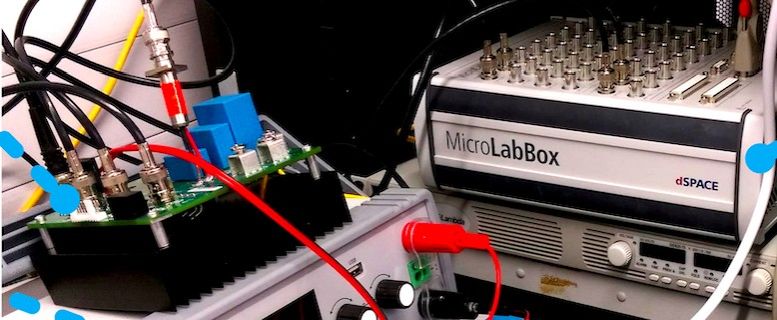Reliability monitoring of Wide Bandgap Power Electronics
Power electronics underpins modern electric and hybrid vehicles allowing efficient energy transfer between the vehicle battery system and the drive motors. EVs have to operate in a wide range of climates and geographies meaning that the electrical systems have to be designed to withstand significant over-stresses, particularly from self-heating and sudden loading during normal operation.
As a result, the power electronics are significantly over-designed to ensure sufficient reliability given the harsh operating conditions. Using wide-bandgap (WBG) semiconductor materials such as silicon carbide allows significant improvements in power density and volumetric efficiency; however, posing challenges including bond-wire and die-attach degradation due to thermo-mechanical cycling, and unwanted stress on the electrical and mounting connections.

Due to the basic differences between WBG and Silicon-based power modules, applying the existing condition monitoring approaches - which are mostly designed for Silicon-based devices - does not necessarily provide the expected accuracy in these circuits. Characterisation and monitoring of the faults in WBG power modules are the prerequisites to achieve robust and reliable high density power electronic design. The figure on the left shows a cross section of DC/DC converter power modules in Toyota 2010 Prius PE system. Considering the existing limitations in electrical parameters-based condition monitoring approaches, we use multi-physics condition monitoring technique. The effect of thermal, electrical, and magnetic physics are considered to have a more accurate junction temperature assessment.
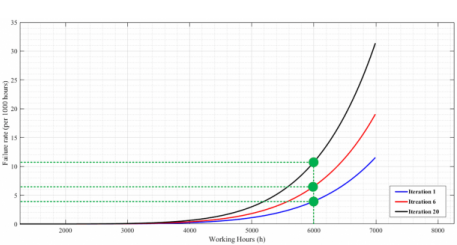
Complete profiles of switch operational parameters have been employed in an iterative process to obtain junction temperature of the switch as the main failure indicator. We use different lifetime models like Weibull-Arrhenius model and Bayerer model, and achieve good accuracy in assessing the switch lifetime based on the real-time switch parameters. The figure on the left shows the comparison of SiC-based switch lifetime estimation in Toyota power module in three separate iterations.
At the same time, real-time measurement based on electrical parameters can results in erroneous results as the WBG devices are quite sensitive to parasitic or ringing effects or electromagnetic interferences (EMIs). Using state-of-the-art magnetic sensors, we are working on isolating magnetic-based reliability models to solve this problem. This Figure below shows the Magnetic flux density distribution of the power module under full load working condition.
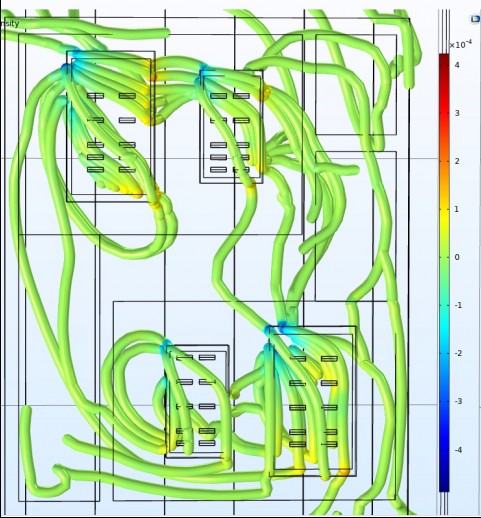
Distributed and Networked Control of Microgrids with communication constraints
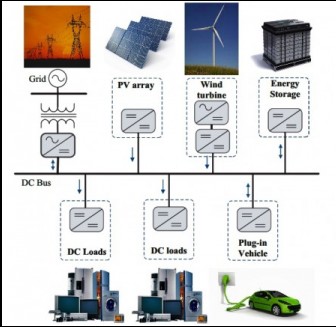
Microgrids (MGs) and nano-grids (NGs) are becoming an essential part of the clean power generation to exploit solar, wind, and wave renewable resources with energy storages to store the intermittent power and provide high-quality power for a small community. MGs can enhance the power factor (especially when grid-connected), energy security, remote energy management, and lower the maintenance. However, their control and energy management is levelised and complex and demands specific design considerations. We focus our research on developing islanded (independent) MG control and communication system, where we enhance MG modelling, stability analysis, and secondary-level control system. We use event-triggered, decentralised models for WSN-based MG with flexible architectures, reduced network traffic, and increased the sensor battery life-time.
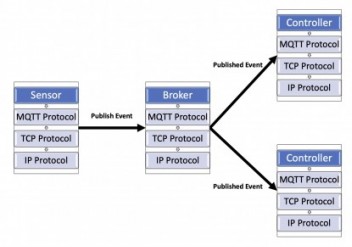
We develop a novel distributed event-triggered control and estimation strategy for DC microgrids to efficiently stabilise the grid voltage, and balance the energy level of the energy storage (ES) systems. The local distributed controllers are designed to reduce the number of transmitted packets and battery usage of the installed sensors, based on an event-triggered communication scheme. The figure in the right shows the event-based implementation using the MQTT protocol stack. An optimal observer reduces the network traffic by utilising a modified Kalman consensus filter (KCF) to estimate the state of the DC microgrid via the distributed sensors. To effectively provide an intelligent data exchange mechanism for the proposed event-triggered controller, we use publish-subscribe communication model to setup a distributed control infrastructure in industrial wireless sensor networks (WSNs). The performance of the networked controller and estimation strategy is shown below via hardware-in-the-loop (HIL) dSPACE simulation of a DC microgrid and its advanced industrial network architectures.
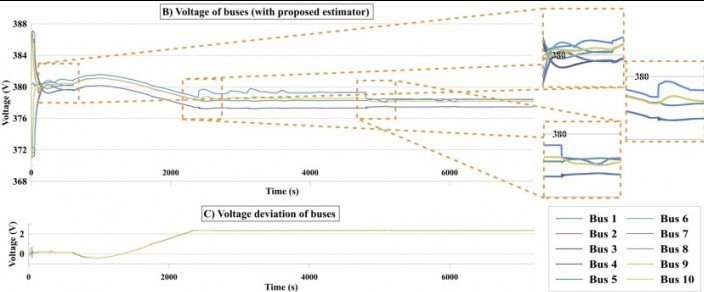
Highlights and Research Outcomes
> Our Microgrid project funded by GCRF Large Grant Scheme is selected to be featured for Research England for establishing strong collaboration with partners in Asian Institute of Technology (AIT) and Provincial Electrical Authority (PEA) in Thailand and University of Dhaka and Ministry of Power, Energy and Mineral Resources in Bangladesh to develop and finance first low-cost microgrid pilot project powered by on-shore wave energy as well as solar energy and use second-life batteries for storing the energy.
Selected Research Projects
> 2019.12 - 2021.06: Hybrid (solar, wave) Powered Micro-grid for Remote Areas using Second-Life Li-ion Batteries (LiBs), £50k, GCRF Large Grant Scheme
> 2018.4 - 2019.3: Multi-physics sensor fusion for power electronic converter prognostics Start, £90k, EPSRC Challenge Network in Power Electronics
> 2017.11 - 2018.4: Aged Lithium-Ion Batteries as Low Cost Solution to Rural Micro Grids, £24k, EPSRC Global Challenges Research Fund
> 2016.7 - 2017.3: Novel renewable energy storage interface, EPSRC Institutional Sponsorship, £20k, EPSRC
Selected Publications
S. A. Alavi, K. Mehran and Y. Hao, "Optimal Observer Synthesis for Microgrids With Adaptive Send-on-Delta Sampling Over IoT Communication Networks," in IEEE Transactions on Industrial Electronics, doi: 10.1109/TIE.2020.3034853.
S. A. Alavi, K. Mehran, Y. Hao, A. Rahimian, H. Mirsaeedi and V. Vahidinasab, "A Distributed Event-Triggered Control Strategy for DC Microgrids Based on Publish-Subscribe Model Over Industrial Wireless Sensor Networks," in IEEE Transactions on Smart Grid, vol. 10, no. 4, pp. 4323-4337, July 2019, doi: 10.1109/TSG.2018.2856893.
S. A. Alavi, K. Mehran and Y. Hao, "Optimal Observer Synthesis for Microgrids With Adaptive Send-on-Delta Sampling Over IoT Communication Networks," in IEEE Transactions on Industrial Electronics, doi: 10.1109/TIE.2020.3034853.
S.A. Alavi, K. Mehran, V. Vahidinasab, J. Catalão, "Forecast Based Consensus Control for DC Microgrids Using Distributed Long Short-Term Memory Deep Learning Models", in IEEE Transactions in Smart Grid, 2020.
S. A. Alavi, M. Javadipour and K. Mehran, "Microgrid Optimal State Estimation Over IoT Wireless Sensor Networks With Event-Based Measurements," IECON 2019 - 45th Annual Conference of the IEEE Industrial Electronics Society, Lisbon, Portugal, 2019, pp. 4145-4150, doi: 10.1109/IECON.2019.8927727.
M. Saffari, M. Kia, V. Vahidinasab, K. Mehran, "Integrated active/reactive power scheduling of interdependent microgrid and EV fleets based on stochastic multi-objective normalised normal constraint", vol. 14, Issue 11, 05 June 2020, p. 2055 – 2064, DOI: 10.1049/iet-gtd.2019.1406
J. Naghibi, K. Mehran and M. P. Foster, "An Online Failure Assessment Approach for SiC-based MOSFET Power Modules Using Iterative Condition Monitoring Technique," 2020 IEEE 21st Workshop on Control and Modeling for Power Electronics (COMPEL), Aalborg, Denmark, 2020, pp. 1-5, doi: 10.1109/COMPEL49091.2020.9265830.
J. Naghibi and K. Mehran, "Multiphysics Condition Monitoring Technique for Reliability Assessment of Wide Bandgap-Based Power Modules in Electric Vehicle Application," 2020 Fifteenth International Conference on Ecological Vehicles and Renewable Energies (EVER), Monte-Carlo, Monaco, 2020, pp. 1-6, doi: 10.1109/EVER48776.2020.9242983
N. Rezaei and K. Mehran, "Dynamic Modelling and Performance Assessment of a Single Battery Electric Vehicle Powertrain System Employing an Induction Motor," 2019 20th Workshop on Control and Modeling for Power Electronics (COMPEL), Toronto, ON, Canada, 2019, pp. 1-8, doi: 10.1109/COMPEL.2019.8769671.

